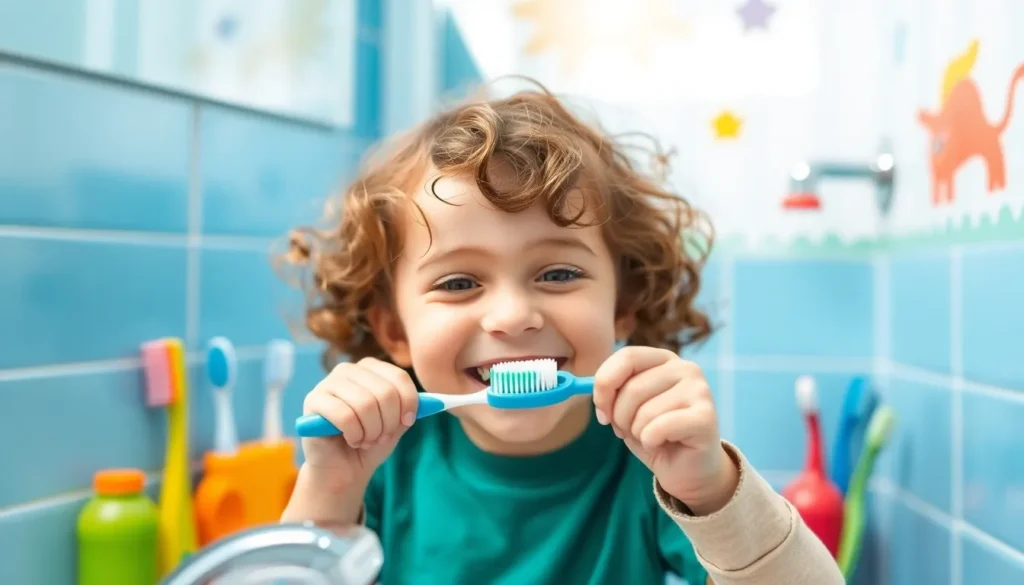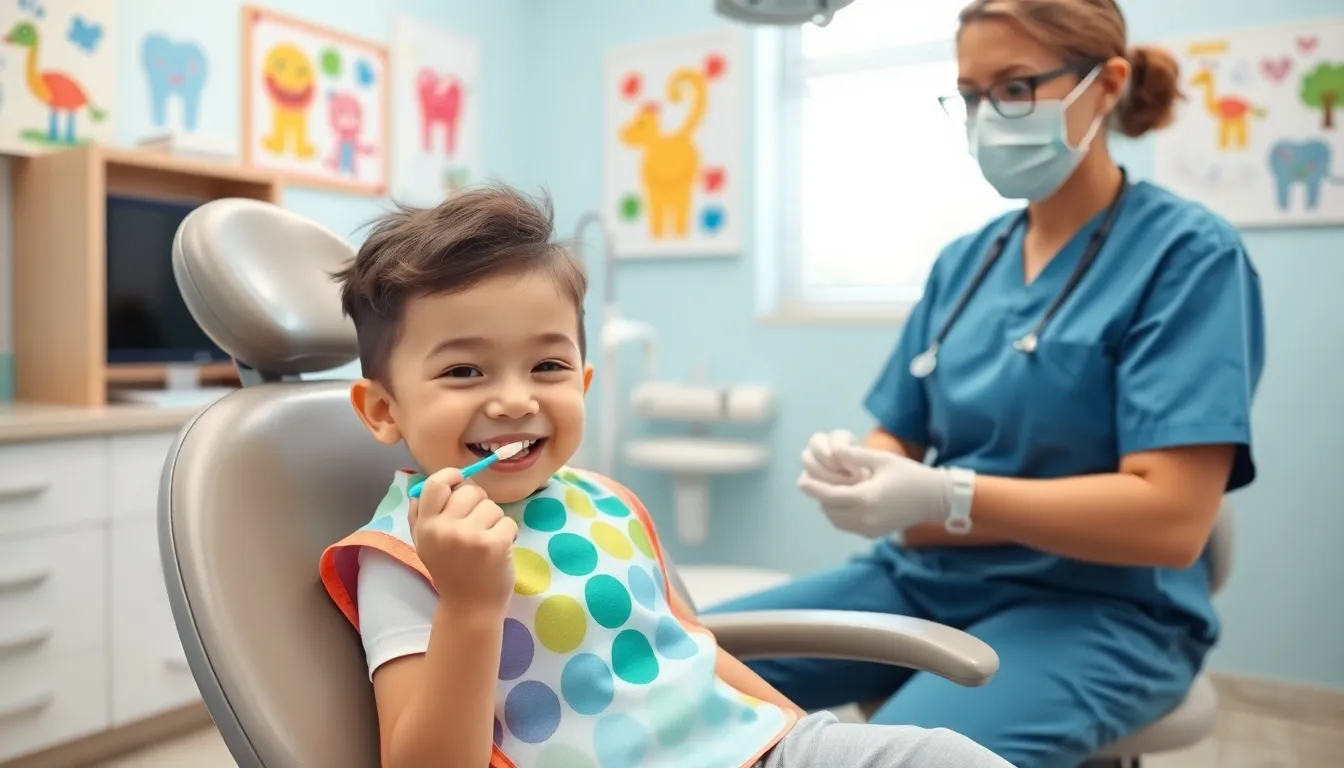Table of Contents
ToggleWhen it comes to preschoolers, keeping those tiny teeth healthy is a big deal. After all, a child’s smile can light up a room—unless it’s hiding behind a mouthful of cavities. Parents often find themselves in a battle against sugary snacks and stubborn brushing habits. But fear not! With a sprinkle of fun and a dash of creativity, dental health can become an exciting adventure for little ones.
Importance Of Dental Health For Preschool
Dental health plays a crucial role in the overall well-being of preschoolers. Proper oral hygiene reduces the risk of cavities and other dental issues, which can lead to pain and discomfort. Early childhood is a vital time for establishing healthy habits. Developing a routine for brushing and flossing sets the foundation for lifelong dental care.
Parents often face challenges in encouraging preschoolers to brush regularly. Using creative techniques can make brushing fun and engaging. Involving children in choosing their toothbrushes and flavored toothpaste can increase their interest. Establishing a daily routine with a specific time for brushing supports consistency.
Regular dental check-ups are essential during preschool years. These visits allow professionals to monitor dental development and address any concerns early. According to the American Academy of Pediatric Dentistry, children should have their first dental visit by age one, or when their first tooth appears.
Good dental health positively impacts overall health. Research indicates that poor oral hygiene can contribute to serious health issues, such as heart disease and diabetes later in life. Teaching children about the relationship between dental care and their overall health encourages them to take responsibility for their hygiene.
Nutrition also plays a significant role in dental health for preschoolers. Providing healthy snacks, such as fruits and vegetables, helps reduce the intake of sugary foods. Educating parents about healthy eating habits aids in preventing cavities and supporting proper nutrition for growing bodies.
Cultivating positive dental habits early on promotes a lifetime of healthy smiles. By prioritizing dental health, parents set their children up for success both in oral hygiene and overall well-being.
Common Dental Issues In Preschoolers
Preschoolers often face several dental issues that can impact their health. Early awareness can help parents take preventive measures.
Cavities
Cavities rank among the most prevalent dental issues for preschoolers. Tooth decay occurs when bacteria in the mouth produce acids that erode tooth enamel. Sugary snacks and drinks contribute significantly to cavity formation. Daily brushing with fluoride toothpaste can prevent decay by removing food particles and plaque. Regular dental check-ups allow professionals to identify cavities early, leading to easier treatment. Monitoring children’s eating habits can also reduce sugar intake, thus lowering the risk of cavities.
Gum Disease
Gum disease, though less common in preschoolers, can still occur. This condition results from plaque buildup at the gum line, potentially leading to gingivitis. Signs include swollen or bleeding gums, which require prompt attention. Consistent brushing and flossing help maintain gum health by preventing plaque accumulation. Children benefit from regular dental visits, where professionals can clean hard-to-reach areas and educate families about proper hygiene practices. Encouraging healthy eating habits also supports gum health, as a balanced diet strengthens immunity and reduces inflammation.
Promoting Good Dental Hygiene
Promoting dental hygiene in preschoolers involves engaging and fun approaches to cultivate lasting habits. Establishing effective brushing techniques and introducing flossing basics enhances children’s oral health.
Brushing Techniques
Brushing techniques play a crucial role in effective dental care. Using a soft-bristled toothbrush can prevent gum irritation while properly cleaning teeth. Preschoolers should brush their teeth twice daily for two minutes each session. Parents can model the correct technique, guiding children to brush in small circular motions. Encouragement can also motivate children to reach all tooth surfaces, including inner and outer areas. Setting a timer or using a fun song can make brushing more enjoyable and help kids understand the importance of thorough cleaning.
Flossing Basics
Flossing basics are essential to complement regular brushing. Introducing dental floss to preschoolers can help remove food particles and plaque from areas that toothbrushes can’t reach. Parents should assist their children with flossing until they’re comfortable doing it independently. Using a gentle sawing motion helps avoid damaging gums. Flossing once a day is recommended, preferably at night, to clear debris before bedtime. Making the process fun by choosing colorful floss or playful characters can encourage preschoolers to adopt this habit.
Nutrition And Dental Health
Nutrition plays a critical role in preserving dental health for preschoolers. A balanced diet rich in essential nutrients supports strong teeth and healthy gums.
Foods To Encourage
Dairy products like milk, cheese, and yogurt provide calcium, which strengthens tooth enamel. Fresh fruits and vegetables, such as apples and carrots, can help clean teeth naturally and stimulate gums. Lean proteins, including chicken and fish, contribute to overall health and development. Whole grains offer necessary vitamins and minerals that promote healthy oral tissue. Incorporating these foods into a child’s diet creates a foundation for excellent dental health.
Foods To Avoid
Sugary snacks like candies and cookies increase the risk of cavities. Soda and sweetened drinks expose teeth to harmful acids, promoting decay. Sticky foods such as fruit snacks cling to teeth, making it difficult for saliva to wash them away. Processed snacks often contain sugars and additives that can harm oral health. Limiting these foods plays a vital role in keeping preschoolers’ teeth healthy and strong.
Regular Dental Visits
Regular dental visits play a vital role in maintaining preschoolers’ oral health. Parents should schedule a child’s first dental appointment by age one, establishing a foundation for proper oral care. During these visits, dentists can monitor developing teeth for potential issues and provide guidance on oral hygiene practices.
Check-ups typically happen every six months, allowing for timely interventions if cavities or other concerns arise. These routine visits foster a positive attitude toward dental care, helping children feel comfortable and familiar with dental professionals.
Dentists often provide personalized advice tailored to each child’s needs, addressing specific concerns about nutrition, brushing techniques, and oral health habits. Utilizing fluoride treatments during visits significantly strengthens teeth and reduces the likelihood of cavities.
Dental professionals also examine gum health, identifying signs of gum disease early on. Parents receive valuable tips on how to support their child’s daily dental routine at home during these appointments.
Building a trusting relationship with the dentist encourages preschoolers to visit regularly without fear. These experiences can set the stage for lifelong dental habits that promote overall well-being.
Regular dental visits reinforce the importance of oral hygiene and contribute to healthy smiles for preschoolers. They benefit from early intervention and education, ensuring that dental issues are managed before they become serious problems. Prioritizing these visits remains essential for long-term dental health and comfort.
Conclusion
Prioritizing dental health for preschoolers is essential for their overall well-being. By fostering good habits early on parents can help their children develop a positive attitude toward oral hygiene. Incorporating fun activities into brushing and flossing routines makes the process enjoyable and less daunting.
Nutrition also plays a vital role in maintaining strong teeth and healthy gums. Encouraging a balanced diet while limiting sugary snacks can significantly reduce the risk of cavities. Regular dental visits further support this foundation by allowing professionals to monitor oral health and provide valuable guidance.
With consistent effort and a proactive approach parents can set their preschoolers on the path to a lifetime of healthy smiles.








